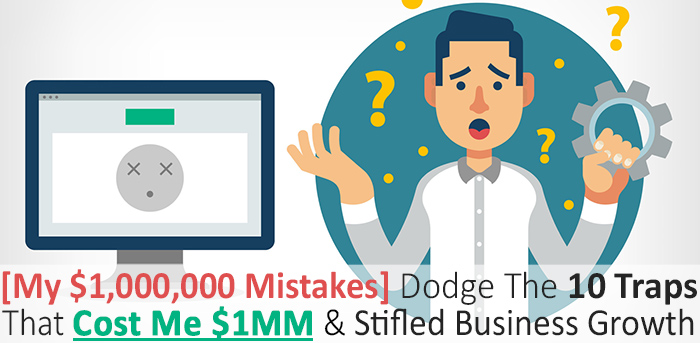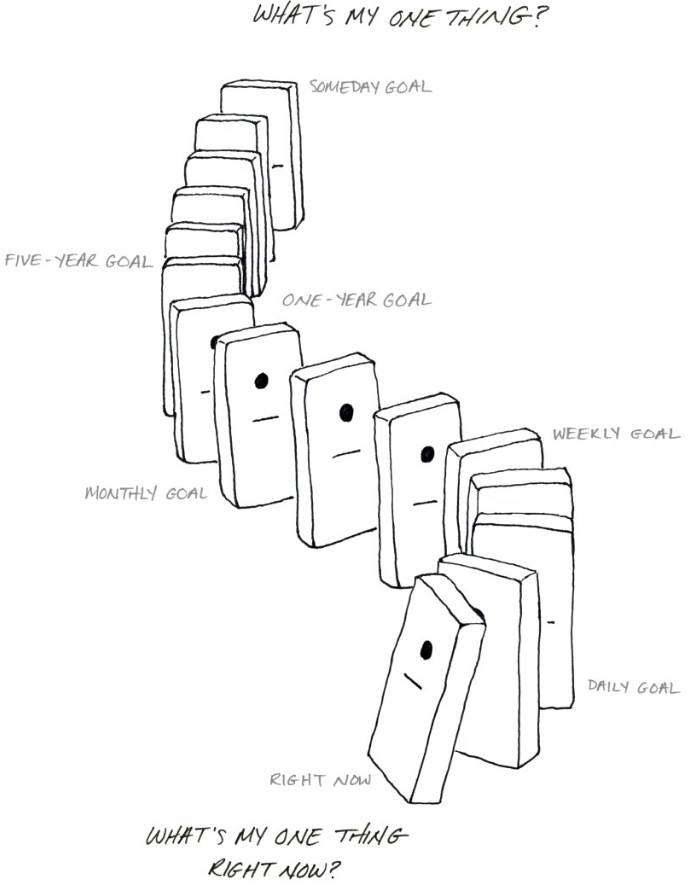
Hi there, and welcome to the November 2017 update to AidanBooth.com, thanks for visiting!
A few weeks ago a friend of mine asked me a question:
“What would you do differently if you had to start your online business again from scratch?”
It got me thinking, in hindsight there is a LOT I’d do differently, things I know now that could have accelerated my business growth, reduced the learning curve, and made my life a lot easier. I made a lot of mistakes and combined, they easily cost me over $1,000,000 in missed earnings and delayed my business growth by several years…
In today’s blog post I share these mistakes with you, I’d LOVE to hear your thoughts about this as well, so leave a comment if you have something to add, based on your own experience.
#1. Treat Your Business LIKE A Business
When you’re just starting out and you’ve got no runs on the board, it’s easy to fall into the trap of treating your business like a hobby. But when you treat a business like a hobby, you get ‘hobby results’.
For me, treating it like a hobby sometimes meant my business would be a second or third priority… something would come up, and my business would be pushed aside to make way for it.
What made matters worse was that my friends and family also looked at it like a hobby… they assumed I was free all day everyday, which lead to LOADS of interruptions (friendly visits, mid-afternoon requests to help out with whatever, etc). Obviously it was never my friends/family’s intention to disrupt my work, it’s just the way things happened in my first couple of “full time” years running my online business (and it was my fault for not laying down the boundaries).
If I started again, I’d make it clear from day 1 that Monday-Friday, 9am-5pm, I’m WORKING. I’d treat it like a business from the get go.
#2. Structure It Like A Business
Although you might just be a one-man-band when you start out, you need to think a little further down the line, and plan a structure to support your growth.
Instead of just ‘winging it’ initially, I’d sit down with an accountant and plan the right structure. My key considerations would be:
Entity
Should you set up an LLC, Corp, Family Trust, or some kind of hybrid combination? It’ll depend on your objectives and your personal situation (where you live). If you don’t live in the USA, should you set your business up there anyway? Again, it’ll depend on the objectives you have, the type of business you have, and where you are physically located.
Withholding Tax
Assuming my business is set up in the USA, and I’m NOT in the USA, then I’d try to address withholding tax from the get go. You don’t want to have your money tied up with the IRS just because you haven’t thought this through properly… and there are strategies that will allow you to legally bypass withholding taxes, these will vary depending on the type of entity you have.
Easy To Sell
What if you decide to sell your business sometime in the future, will your structure support that?
It’s very easy to get stifled with this whole structuring process, my advice is to try to keep things as simple as possible. Set up a meeting with you accountant (often you can get a free initial consultation) and explain what you’re doing in the simplest terms possible.
Setting up your business structure can take some time and cause a few headaches, especially when accountants and/or lawyers are involved, but don’t let that slow down your progress… keep charging forward, slot the ‘structure’ into place once you have it.
My high-level structure is as follows:
- Mother Company
- Child Company (information products)
- Child Company (software #1)
- Child Company (software #2)
- Child Company (physical products/selling on Amazon)
- Child Company (consulting)
- Etc
In this kind of setup, you can own (or be director of) the “mother company” 100%. The mother company then owns a percentage of the child companies (will be 100% if you don’t have partners).
You can set things up whereby you draw a salary from each company, or take a distribution of the profits… the route you’ll take will probably depend on the kind of entity you have, how much you earn, tax advantages, etc.
The reasons I like this kind of structure are:
- Makes it easy to sell off a company without complications
- Each company can have different owners/partners (Steve and I are 50:50 owners in most of our businesses, but there are a couple where we have other partners as well)
- Each company can easily grow independently without interfering with the others
- Accounting is easier
Again, it pays to get expert advice, but hopefully this gives you some kind of idea about the kind of thing you might want to set up.
SIDE NOTE: Once your company is set up and making money, a good accountant and tax attorney should save you WAY more than what they charge you! Getting good advice is invaluable!
#3. Focus On ONE Thing
When I started out, I fell into the trap of trying to pursue so many different opportunities at the same time…
- Little Affiliate Marketing
- Large ‘Authority’ Affiliate Sites
- Drop-shipping
- Setting Up A Local SEM Business
- Seasonal Marketing
… the list goes on!
Some people call this ‘shiny object syndrome’… for me, since I didn’t have a mentor, I was like a crash test dummy, trying things out until something worked.
I learned a LOT in a short amount of time, but the cash returns for my efforts were pretty bad, I was just too diversified, and didn’t stick with anything long enough of focus on anything closely enough to hit a tipping point and really cash in.
If I were to start over again, what I’d do is spend 90% of my time on one MAIN project, and 10% on another opportunity. I’d divide my time out accordingly, and build a plan around the time I had available.
Part of my plan to focus would be to un-subscribe to different email lists I might be on (only stay on the email lists you really need to be on) and ruthlessly eliminate distractions. Every distraction is slowing you down from reaching your goal… stay focused.
TIP: I recommend you grab a copy of ‘The One Thing’, by Gary Keller. This is one of the top 10 business books I’ve ever read, and has proved invaluable over the past few years.
#4. Get A Mentor
When I started seriously looking to invest in property, back in 2004-2005, I read every ‘property guru’ book I could find. I scoured through property magazines and started attending seminars to learn more and more…
In 2007-2008 when I was living in Auckland, New Zealand, I finally hired a ‘property coach’. I was ready to buy my first New Zealand apartment and I wanted help from someone who’d been there and done it many times before (I bought one in Argentina in 2006… but that’s a whole different beast, very different to buying in New Zealand!).
My property coach already owned 20 properties in Auckland, and about half of them were apartments, so he understood the market well, the potential pitfalls, but also the negotiating process.
I remember contemplating the decision to hire my coach for quite a while… my coaches fees seemed too high… I couldn’t really afford them, and I felt I had a lot of the knowledge already (albeit based mainly on theory!).
Thankfully I hired him anyway, and in my first 30 minutes of speaking to him, he’d already proven his worth and saved me thousands (he ended up saving me TENS of thousands when I got into purchase negotiations).
Unfortunately when I started my online business I didn’t hire a coach… when I got started I didn’t really even know that coaches or training courses existed for aspiring online marketers!
In hindsight, I could have saved myself a lot of money and a lot of time if I had someone to guide me along…
Like my experience with my property coach, the best option for starting an online business is one-on-one consultation with someone who has already achieved what you’re striving to achieve. If this isn’t affordable or available, then invest in a group training program, and follow along with that.
The key is that the person who is guiding you is someone who knows what they’re doing, and is able to help you with the decision making. Done-for-you blueprints (like 100k Factory) are great, you just need to make sure you choose the right one, otherwise you’ll end up wasting time and money (invest in something you trust).
#5. Outsource and Delegate
It took me a couple of years to realise that I needed to outsource and delegate tasks… and when I finally started outsourcing, my business growth accelerated big time.
I got started with outsourcing mundane one-off tasks, like content creation, and over the past decade have built up a 50+ strong team who work for me (and Steve).
The key concept that you need to understand is what is YOUR time worth?
If you’re doing tasks that you can offload to someone else who you can pay for less than your own ‘hourly value’, then you’re doing yourself a DIS-SERVICE if you don’t outsource.
Quick Example: If you earn $100,000/year, work 50 weeks per year, and work 40 hours/week, then that’s an hourly value of $50/hour.
In reality though, your time is worth way more… because you won’t be able to build a big business all on your own, and if you’re working a full time job and building your online business on the side (like I was), then your time becomes even MORE valuable, because you have less of it available!
Outsourcing is always perceived as being more difficult that it actually is… all you really need to do is:
- Write an explanation or film a screen-capture video showing what you need done (I’m currently using Wistia Soapbox for this)
- Post the job description on Upwork.com or Freelancer.com
- Filter through applicants
- Award the job
- Provide help/training to your worker (if necessary)
- Provide feedback (so they can do it better next time)
That’s it!
And the same basic process works equally well for complex tasks.
Remember… there is ALWAYS someone out there who can do it better than you!
#6. Work On Your Mindset
I didn’t think much about this until I’d been running my business for a few years.
Do you have an abundance mindset, or a scarcity mindset?
Luckily, I’m naturally an optimist and an abundance mindset comes a little easier to me, I still had to work on it a lot though (and continue working on it).
When I was starting out, there were times when I was definitely my own worst enemy. A recurring theme related to the mindset of money, and being:
“penny wise, pound foolish”
Making decisions that don’t always benefit the master plan.
For example, I could hire a designer and pay him $5 to make me a logo… If I’m lucky I might get something ‘okay’ back…
Alternatively, if I’m building something I want to turn into a big brand (like a physical product to sell on Amazon), I could hire a designer on 99 Designs, pay several hundred dollars, and get an exceptional world-class design, which would in turn help my Amazon product succeed more easily and pay itself off many times over.
It takes a while to train your mind to think in terms of abundance (it’s easier for optimists) and think BEYOND your current reality.
Another example of mindset challenge was making the leap from traveling in coach class to business class…
My business grew to a point where I could easily afford it, yet for a couple of years I kept traveling long-haul (8+ hours) in coach. I made the logical argument that I could save a few thousand dollars and put it to use elsewhere (and this IS a valid argument initially, but it’s not for me now).
What I’ve found though is that travelling in business class is actually a really smart decision for me for multiple reasons, and it really does help my abundance mindset.
Even just the fact that I arrive refreshed after a 10 hour flight and can hit the ground running makes it worthwhile to me (based on what I value my own time at, this is alone is worth thousands). If I’m able to comfortably work for a couple of hours on the flight as well, then that’s also worth thousands…
Now, I KNOW that money is often very tight and I’m not suggesting you just go crazy… have some common sense!
When I started out I was in heavily in debt with a couple of mortgages, and working a 40 hour week day-job… but even so, adopting an abundance mindset earlier on would have helped me grow my business faster.
#7. Leverage Email Marketing (& Re-Targeting)
During the first year building my online business I didn’t use email marketing at all (ignorantly, I thought it was silly to spend $20/month on Aweber)… even in my second full year when I started using it, I still didn’t rate it as being all that important…
In my third year I really embraced building an email list, and my profits skyrocketed.
In the first two years of my online business I had an easy source of targeted traffic at my fingertips which I just wasn’t using. Had I known then what I know now, I would have hit my initial $100k/year milestone MUCH faster.
Email marketing (and lead generation) should really be the backbone of most online businesses, not an after-thought, but an actual focus from the get go.
Every product should have a funnel attached to it (assuming you want to maximize profits), and email marketing should be treated as a critically important marketing activity.
In addition to email marketing, retargeting should be used in a similar way.
#8. Genuinely Add Value & Differentiate
Differentiation and quality make marketing 100 times easier.
Every website or product you sell should genuinely add value or be of a good quality. If you don’t provide value, you can forget about repeat customers and you’ll majorly stifle your growth…
A good everyday example of this ‘value/quality’ concept and it’s effect on business is looking at coffee shops in my neighborhood in Buenos Aires…
I’m fortunate to live in a residential area well connected to different parts of the city, to parks, nightlife, and dining. In a quarter-mile radius of my apartment, I have at least a dozen different coffee shops (café culture is huge in Buenos Aires).
Of the 12-13 different coffee shops, the ones that do the best are those that offer great table service, good food and have a friendly atmosphere.
Recently several new coffee shops have opened, each one of them looks AMAZING from the outside and they really do entice you to go inside. They look great at face value. What I’ve found though is that their service sucks, the staff aren’t as friendly, and the food isn’t as good (as other cafés nearby). These new coffee shops were packed for the first couple of weeks, but regularly just have a few people inside…
People don’t return, because they weren’t 100% satisfied with the ‘product’ (coffee, food, service, atmosphere) the purchased.
The EXACT same thing happens with online business.
In the early days of my online business I focused a lot of time on ‘middle-man’ affiliate sites that provided reviews and basic consumer information, but not all that much genuine value.
If I’d taken a ‘value first’ approach, I’d have more lucrative affiliate sites today, however most of my affiliate sites (the lower quality ones) have long since died (not surprisingly, the most profitable affiliate sites we do still have are the ones that add value).
It’s not just related to affiliate marketing though, the same ‘value first’ approach can be used with physical products as well.
Any new product we launch on Amazon is genuinely GOOD, and where possible is different to the existing competition.
Our best drop-ship stores (100k Factory method) are the ones that offer the most value to their customers. We do this in a number of ways, a few approaches include:
- Providing a great range of specialized products
- Offering superior service to the competition
- Providing a community (in some cases)
- Offering competitive pricing
- Looking after customers
As you start your business, think about how you can make yourself stand out, and how you can provide better value.
Another couple of my top 10 business books are ‘Differentiate or Die’ by Jack Trout and ‘Blue Ocean Strategy’ by W. Chan Kim, I highly recommend these books, they’re an easy read and VERY applicable to anyone starting an online business.
#9. Understand (and track) Your Vital Levers
When I started out, I was guilty of not tracking key metrics, and indeed not even really understanding, or thinking about the impact those key metrics have on my business.
Over and over again I see new businesses struggle with this as well… they just don’t track metrics.
Let’s say you’re selling physical products on Amazon, that’s you’re business model, and you’ve got a product up which makes you sales. On a monthly basis you should be tracking:
- Number of sales that came organically (from searches)
- Number of sales that came from paid Amazon ads
- Amazon ad impressions (views) and clicks (traffic)
- Amazon listing conversion rate
- Keyword rankings
- Your product pricing
- Your review count
And this is a BARE MINIMUM.
By having key data like this, it allows you to pinpoint problems and build a story each month about what’s happening… so that you can truly understand what’s going on.
If sales revenue spikes in November, is it due to an increase in your conversion rate, or your traffic, or both? And if your conversion rate has stayed steady (which would mean that you must have got more traffic, assuming your price didn’t change), where has that traffic come from? Perhaps improved rankings for an important keyword? Or perhaps you’re getting more clicks on your paid ads?
Traffic and Conversions are two vital levers that affect EVERY business (from coffee shops in Buenos Aires, to eCommerce stores).
Increase traffic or conversions, and your bottom line normally increases along with it. So the question becomes, how can you increase your traffic and conversions? If you manage to do this in a sustainable way, you’ll almost guarantee business growth.
#10. Build A Plan & Set Clear Goals
When I started out, I had no plan. No roadmap. No path to get me to my goal of having a location-independent income stream and being financially free.
I didn’t know in my mind what finished looked like… all I knew was that I wanted to make money online so that I could quit my job, and go traveling.
If I’d built a more comprehensive plan, and set some clear goals, I would have progressed much faster.
If I had to do it all again, I’d start with a mid-term goal, perhaps 5 years from now. I’d work that back to a 12 month goal, and then break than down one step further to a 3 month.
My goals would drive my actions, so I’d meticulously plan out action items (tasks) that would ensure I hit my 3 month goals, and put me on the right path to him my 12 month goal, and 5 year goal.
Here’s a simple example tied to earnings:
5 Year Goal – Have a $1,000,000/year profit passive income stream
1 Year Goal – Be at a $100,000/year profit run rate
3 Month Goal – Launch my first product on Amazon
I’d dive down deeper into my 3 month goal and map out exactly what I’d need to do to achieve my objective, the task list would include things like:
- Research product ideas
- Reach out to suppliers to get samples
- Design product logo and packaging
- Order first batch
- Etc
Those action items would drive my daily to-do lists, and I’d stay laser focused on making sure I complete them all.
After the 3 month cycle is complete, I’d plan out another 3 months with a new 3 month goal, and new action items (always tied to my longer term objectives).

My goals would drive my plan, and my plan would be documented on spreadsheet. I’d build a rough forecast outlining what my expected income and expenses will be each month, and update it as time goes by.
A common objection I get when explaining this method is… “but I don’t know what to expect”. That’s FINE, and it’s completely normal. But any plan is better than no-plan, and you’ll be able to tweak it as you move forward.
A great analogy I heard recently goes as follows…
Imagine you need to drive your car from New York to Los Angeles during the night. You can’t see the destination, in fact, you can probably only see a few hundred yards in front of you… but you head off anyway using your map. Little by little you get closer to your destination, and you tweak your path constantly along the way.
The moral of the story is that you ONLY need to know your next action item, your next step… the rest will become apparent as you set off on your path. There’s no point in thinking about how you’ll navigate through obstacles months from now, worry about them later.
Hindsight…
Hindsight is a wonderful thing to learn from. I hope you find these thoughts useful, and use them to help as you grow your own business.
Never give up… the online business dream is REAL, and as long as you keep taking small steps forward towards your goals, you’ll get there.
I’d love to hear your thoughts, feedback, questions, ideas, so leave a comment below!
Thanks for reading,
Aidan







I read ‘the one thing’ after you recommended it to me last time, that domino concept has stuck in my head every since. Great book, thanks for sharing these tips
Yep, that book has several very powerful concepts, great read. Thanks for the comment Lewis
Awesome stuff as always Aidan. I think my biggest mistake (by far) was jumping from one thing to another.. when I finally stuck to something, I started to get results.
You’re not the first to fall into that trap Rob… it’s probably the most common issue people face I think.
I can relate to these too. What I’ve struggled with is time.. I work about 55 hours/week, and it leaves very little time to actually get ahead with my online endeavours… so I’m kind of making progress in fits and starts. I ave a partner helping me now though, and a VA, so hope to start seeing some tangible results.
It’s tough… full time work, and starting a business, no doubt about it. You’ve done a smart thing in getting a partner, and hiring help. Keep at it, stay focused.. the results will come.
My biggest struggle is the internal motivation to do the individual mundane tasks needed to make this work. Whether it is writing, placing adds, adding new products to my store / funnel, it’s a mind trick to get me to do any actual work.
For that, I hired a coach. He’s not an expert on online marketing. I have the training to tell me what to do, though. I relay that to him and he calls me once a week to see if I did it. Strangely, that’s enough. I do so much more now with him than I did before.
Hey Joe.. I can totally relate. What I have always done (and this works for me), is to tackle the job I’m dreading most early in the morning, that’s the first thing I do each day. This along with an accountability partner/business partner goes a long way to nailing goals and staying motivated.
Thank you for a great reminder Aidan. I have devoted myself full time to do this online business but i certainly fall in all these traps. I am working on my mind set, selling on Amazon and working on 100k Factory at the same time – is it too much? should I just focus on one business model at one time?
Hi Lana, I think if you’re working 40 hours/week on this, you can definitely focus on more than one model. With things like selling on Amazon, there can sometimes be a lot of waiting around (for samples, products, etc), so having another plan to work on is beneficial in most cases.
Thanks for this, Aidan, awesome tips as usual. My biggest problem is being too diversified but I’m working on focusing on one thing at a time
Good stuff Joan, and you’re welcome!